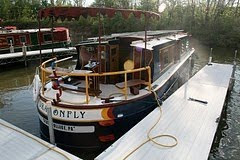 |
| In the news: A SlowBoat's-eye view of Fort Sumter, South Carolina, where the Civil War started 150 years ago this week. |
We've back on the boat today, and heading north up the Chesapeake. Back in Homer, Mom pointed to the map, raised her eyebrows and said, "You're going to be way out THERE?"
Yup! Back in the groove: dodging crab pots, waving to the Coast Guard, scoping for loons, which are starting to show their spring checkerboard plumage. Sixty-four degrees and feels like 40, wearing all my fleece. It's bittersweet. After all, the seed for this trip was planted two years ago when Cap resolved to give his dad a treat by renting a boat and cruising the Erie Canal.
Driving south Tuesday we crossed the line into Virginia and the first thing we saw was an elaborate fireworks establishment, flying the Confederate flag over a billboard that read: "Welcome to Dixieland."
 |
| The 33-star flag over Fort Sumter More info HERE |
Dixie! If you consume any media at all, you may have noticed that Tuesday also marked the 150th anniversary of the start of the Civil War. This trip has floated us past so much Civil War history. Indeed, just a few weeks ago, we visited Fort Sumter, where the first shots were fired on April 12, 1861.
Our trip focuses on energy technologies, not American history or social justice. But these are hardly monolithic topics. From an economic (and a "principles of physics") perspective, the institution of slavery WAS an energy technology. It was a way to accomplish work. Slave owners used cheap human labor instead of other energy sources, such as hydropower, wind power, steam power, or horse or mule power.
 |
| The former Slave Mart in Charleston. Click HERE for an amazing radio interview with a woman who portrays a slave at Colonial Williamsburg |
If slave-owners had instead been required to pay a living wage to their many employees, the antebellum economy would been quite different. And if WE had to pay the hidden costs of using fossil fuels, OUR economy would be quite different too.
OK, enough musing. Welcome back to the SlowBoat blog, and we're glad you're along for the ride.
Keep reading (new post below) below for the latest boat news.
If you know other folks who would enjoy this blog, hope you'll share the link to this site.
If you want to visit SlowBoat, we expect to be in Annapolis sometime between Saturday, April16, and Monday, April 18. Send email to slowboatcruise@gmail.com
And remember, if you want auto-notification when new posts are up, you can follow the blog on facebook or subscribe to the Twitter feed.





No comments:
Post a Comment